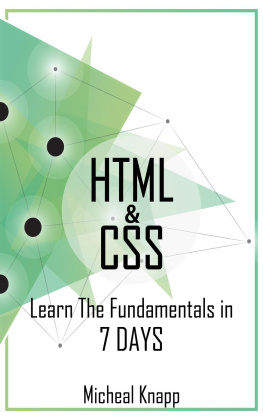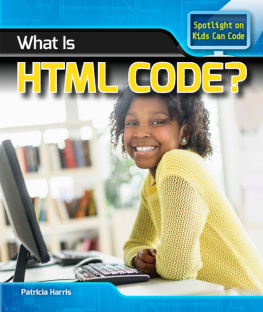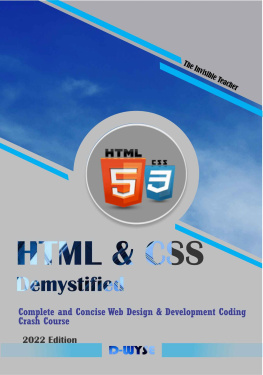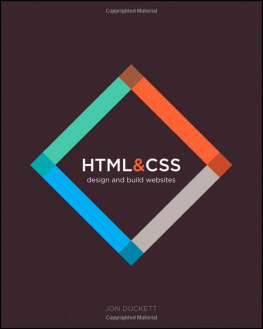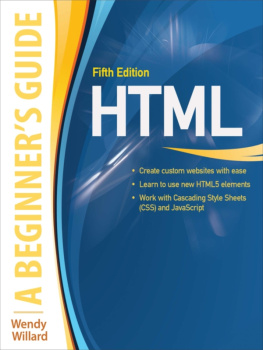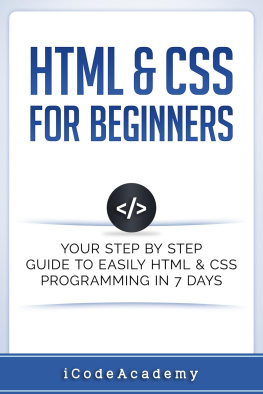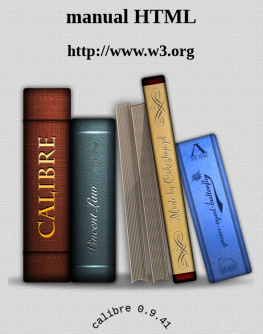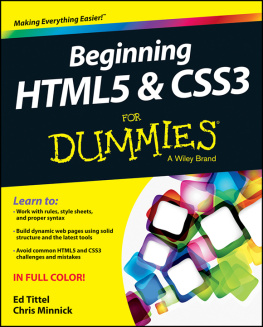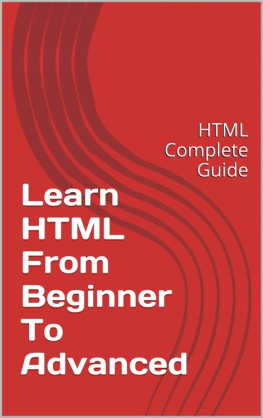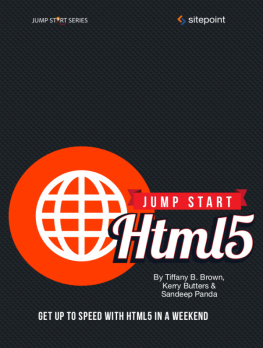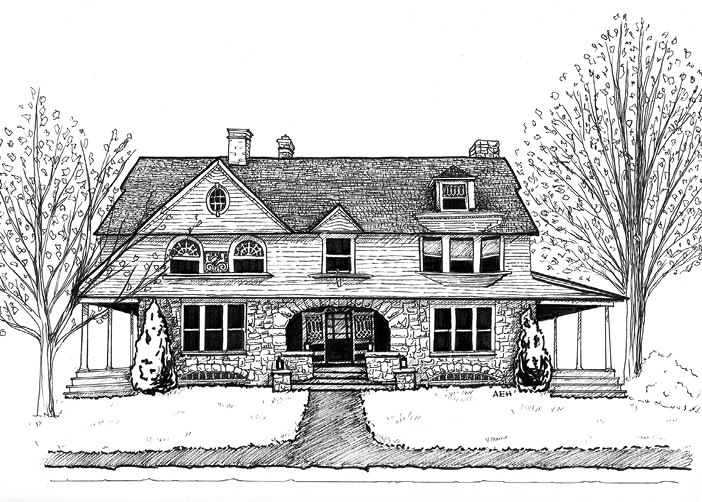Table of Contents
BEFORE YOU START READING,
DOWNLOAD YOUR FREE DIGITAL ASSETS!
DOWNLOAD DIGITAL ASSETS NOW:
www.clydebankmedia.com/htmlcss-assets
* Must be a first time Audible user in the United States, United Kingdom, France or Germany. Audible membership is $14.95/month after the first 30 days. Easily cancel anytime.
Introduction
Congratulations on your decision to learn HTML and CSS! These languages are used daily by billions of people on web pages and apps and in countless other forms. Whether youre planning to build websites, wish to have an informed conversation with a developer, or just want to have a better understanding of the world around you, this book is a great start!
HTML and CSS Are Everywhere
It is nearly impossible to go about your day without encountering HTML and/or CSS. These languages lurk behind every web page, most application screens, television and video game console interfaces, and even the screen of your new smart fridge. You are continually consuming the results of this code but probably rarely stop to think about whats under the hood. Thats about to change.
My Story
Hello! My name is David. I grew up in a small town outside of Rochester, New York. I spent countless hours of my childhood exploring the beautiful outdoors of upstate New York, Vermont, and New Hampshire via the plentiful hiking trails and campsites.
I didnt have a computer in my home, but that wasnt unusual at the time. My interest in technology started early, and video games helped fuel this passion. Once I had access to a computer, I began to teach myself coding in a programming language called BASIC. In high school, I moved on to HTML, CSS, and JavaScript.
When I was deciding what path to take, I considered computer science, software engineering, and other tech-heavy options. I eventually decided to pursue a degree in information technology, which I saw as a bridge between the computer and the human side of tech. I attended the Rochester Institute of Technology and was able to learn from some fantastic professors, many of whom came from non-computer-related backgrounds. They became teachers when the skills they had learned developed into a new industry. These professors helped me to see that sharing skills I have learned can take many forms.
In 2008, after moving to New York City and working in my field for several years, I was offered a position as an adjunct professor at the CUNY City College of Technology, where I rounded out the web design curriculum by introducing different web technologies I used in my everyday life on web development projects. Since then, I have moved on to other schools where I teach a wide variety of classes covering HTML and CSS, JavaScript, PHP, and WordPress. I enjoy the process of teaching, seeing new students confidence grow as they feel more comfortable with new ideas, and watching the light bulb blink on when they see how they can use their newfound knowledge.
Outside of teaching, I work for Adobe as a technical account manager supporting the Adobe Experience Cloud collection of products. I still do plenty of freelance web development projects, and when Im not building things online, I disconnect through hiking or camping on our local trails or in the mountains of Vermont and New Hampshire. At home, I dabble in woodworking and beekeeping. My wife and I work with various animal rescue organizations and are restoring our 1897 Shingle Victorian house in the northwest corner of Connecticut (figure 1).
On-the-job learning has always been a part of my life. Though my education gave me a wide range of skills, the technology industry is continually changing. The number one skill I have developed is learning how to learn. I always find myself researching and learning new tools, techniques, and strategies for the work that I do.
In the spirit of continued learning in an ever-changing landscape, I wanted to write this book to create a quick but comprehensive guide to the tools I see as most valuable and most used in my experience as a web developer.
Why Learn HTML and CSS?
There are numerous reasons why you might have picked up this book. You may be interested in coding and someone suggested that you start with HTML and CSS. Your company may need to build or revamp a website. You may wish to start a web design firm. Or, like me, you might simply have an insatiable desire to learn.
Regardless of your motivations, HTML and CSS are a great place to start learning how to code. The languages require only a text editor and a web browsertwo things you already have on your computer. And HTML and CSS offer instant gratification. You can put a few lines of HTML into a text file, save it, then open the file in a browser and immediately see your results.
The instant feedback of writing HTML can be appealing and satisfying to those who do not consider themselves computer experts. Results appear with a few straightforward instructions. Even a basic understanding of how to use these tools can give you a sense of moving from computer user to superuser. While its not technically programming, writing frontend markup in languages like HTML and CSS allows you to provide direction to the computer to display content in the precise way you desire.
Q: Is HTML a programming language?
Technically, HTML is not a programming language. HTML stands for hypertext markup language. A markup language marks up text with instructions for displayin this case, via a web browser. Programming languages, on the other hand, use logical control statements to direct the flow of the programs execution. Programs take input and produce output, whereas HTML and related markup languages format existing content. Both are called coding, but there is a subtle difference.
WordPress
WordPress excels at blog and website creation but removes some of the control you have over HTML and CSS code. Its simple to add a page or blog post, but customizing the overall look and feel of the website, or creating a new website theme, requires knowledge of HTML and CSS. Even if you use WordPress, knowing HTML and CSS will transform your WordPress data entry skills into those of a full-fledged WordPress web developer.
Wix and Squarespace
Wix, Squarespace, and other website-building tools are excellent platforms for building a website. Their easy-to-use interfaces allow you to create a simple site with no knowledge of HTML. Both Wix and Squarespace allow for customization, but some custom HTML, CSS, and JavaScript isnt possible inside their platforms. Moreover, the website you build cannot be downloaded and used on other web servers. You must continue to purchase their services to maintain your site.
Who Can Benefit from This Book?


